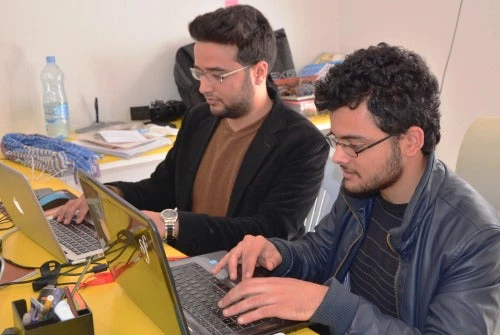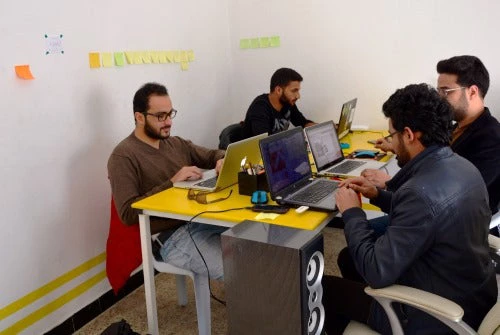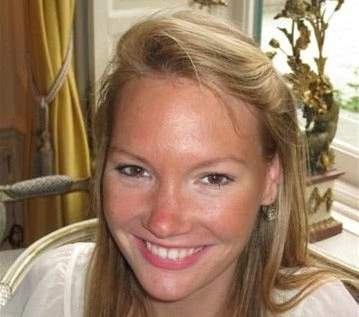 “There’s no weekend for an entrepreneur,” said 24-year-old Hamdy Ben Salah with a smile, when we met on a sunny Saturday morning at his home-based office, where Elyes Labidi and Boulabiar Marwen—two of his five colleagues—were already sitting in front of their computers. The small room they sit in used to be kept for household garbage. But, with furniture and some paint, today it is the base of
AlphaLab.
“There’s no weekend for an entrepreneur,” said 24-year-old Hamdy Ben Salah with a smile, when we met on a sunny Saturday morning at his home-based office, where Elyes Labidi and Boulabiar Marwen—two of his five colleagues—were already sitting in front of their computers. The small room they sit in used to be kept for household garbage. But, with furniture and some paint, today it is the base of
AlphaLab.
Young entrepreneurs like them are determined to change the Tunisian tech scene by focusing on digital solutions for local problems. This team has worked together on a freelance basis, creating six new applications in the past year, and their company is now official—its registration going through just a day before I arrive.
Their aim now is to create mobile solutions to citizens’ local problems.
As Ben Salah guides me through Soliman, an hour southeast of Tunis, he explains it is all about his hometown, a small industrial municipality of about 30,000 inhabitants. His team has turned down offers to move to Tunis. “Regardless, if we grow, we would always keep an office here in Soliman,” said Ben Salah, determinedly. To him it’s important to show that being an entrepreneur is not just about money or being located in the capital.
Today, technology is not yet part of people’s daily lives in Tunisia, but the AlphaLab team is confident that if technological solutions are on offer, the interest will follow. “We would like to make Soliman known for its usage of technology, a model for the rest of the country,” explained Ben Salah.
The entrepreneurs have many ideas, including one for an app offering grocery shopping services. Many people in Soliman buy their groceries at the local store on a daily basis, explained Ben Salah. But, by offering promotions through the app, the hope is a service that will not only save time but money.
“We want to propose solutions for challenges in daily life,” said 22 year-old Marwen, who like Ben Salah, grew up here too. The hope is to begin with this area and then expand to the rest of Tunisia.
 The young men also hope to help modernize and improve the industrial sector around Soliman. But it is not easy for a team of young Tunisian tech guys to convince people working in industries where many employees are older and may instinctively reject mobile applications. It takes time, explained Ben Salah: step-by-step, companies have started to listen to the young team trying to gain the older generation’s trust. “We need to prove that they need us,” he said.
The young men also hope to help modernize and improve the industrial sector around Soliman. But it is not easy for a team of young Tunisian tech guys to convince people working in industries where many employees are older and may instinctively reject mobile applications. It takes time, explained Ben Salah: step-by-step, companies have started to listen to the young team trying to gain the older generation’s trust. “We need to prove that they need us,” he said.
Being an entrepreneur in Tunisia is not always easy : just to register a company can be challenging. Ben Salah estimates it takes two weeks to complete the five-stage process, each step requiring multiple paperwork.
He showed me the folder of all the documents required. “We survived the hardest part,” he joked. Besides paperwork, setting-up a business means meetings with people in Tunis, making it difficult for people living on the fringes of the country.
“Many give up along the way,” said Ben Salah.
As well as debate on registration, there is heated debate concerning restrictions on using e-commerce payment systems. PayPal and other international services have not been made legal in Tunisia , making it difficult for local entrepreneurs to target a global audience. The Tunisian Dinar is a closed currency: it is not allowed out of the country, and Tunisians are only allowed to convert a limited amount of Dinars a year into other currencies.
Five years after its political revolution, Tunisia’s government has acknowledged economic challenges, including a lack of foreign investment and a high unemployment rate. Many Tunisians call for a second revolution, this time for economic opportunities , including entrepreneurship and the employment it creates.

used to taking risks” - Hamdy Ben Salah
Ben Salah is among the young Tunisians fighting to make Tunisia an entrepreneurship hub . To him, the solution is for local companies to work together, strengthening each other through collaboration. “Their success will be beneficial for us too,” he argued.
But relatively few young Tunisians consider starting their own business , many taking the conventional route to finding a job instead. “Young people are not willing or used to taking risks,” said Ben Salah. “There is not a mentality of taking initiatives.”
An engineer in Tunisia can earn about 500 euros (US$570) a month , which 19 year-old Labidi says is not too bad. But it can be difficult to advance from there. Labidi is doing work experience with Ben Salah while studying at the Higher Institute of Computer Ariana. “It was my dream to become an engineer,” he explained, though he sees the work they do at AlphaLab as a long-term commitment, too.
“As an employee, you are just someone else’s tool,” argued Ben Salah, who believes success in Tunisia is measured by an outdated model of a stable, full-time job from 8am–5 p.m. “People are just following and not leading,” he said. For him, it is all about trying to encourage change by working hard: “Motivation is my fuel.”
He gives motivational speeches at public events as often as possible. That’s how he motivates himself. No coffee—instead, when he needs energy, he watches a speech by Marc Zuckerberg or Steve Jobs, for example. Motivation costs nothing. “It’s not about money, it’s about the challenge,” Ben Salah concluded.


Join the Conversation